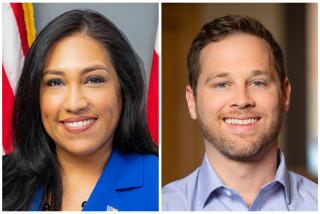Distinct Philosophies Define Rivals for Secretary of State
- Share via
Both major candidates for secretary of state want to increase voter turnout, wipe out voting fraud and modernize the way Californians cast ballots. But there the similarities end.
Assemblyman Kevin Shelley, son of a former San Francisco mayor, is an admittedly intense liberal Democrat with a reputation for ramming bills through the legislative process and rough treatment of his staff.
For the record:
12:00 a.m. Nov. 2, 2002 For The Record
Los Angeles Times Saturday November 02, 2002 Home Edition Main News Part A Page 2 National Desk 6 inches; 244 words Type of Material: Correction
Secretary of state candidates -- A caption accompanying a story in Friday’s California section about the secretary of state race transposed the names of the two pictured candidates. Keith Olberg was on the left and Assemblyman Kevin Shelley was on the right.
Keith Olberg, who has a doctorate in constitutional law, is a former assemblyman from Southern California who has lifelong Republican credentials and is working for a controversial charter school.
“We frequently squared off on policy issues,” Olberg recalls of his days in the Assembly with Shelley. Now they are squared off in a tight race for a job that both say is the first line of defense of the right to vote.
The importance of the secretary of state’s job was elevated dramatically after the Florida balloting fiasco in the last presidential election. And history has demonstrated that the post can be a political steppingstone.
With their power bases at opposite ends of the state, neither Olberg nor Shelley enjoys a high profile outside his area. But Shelley has relied heavily on traditional Democratic support, such as organized labor and trial lawyers, to gain the upper hand in fund-raising. He reported $1.2 million in cash on hand as of Oct. 19. Olberg reported about half as much in his coffers as the contest heads toward Tuesday’s vote.
Olberg, 42, is a Chicago native who says he groomed himself for public service by studying political science, including his doctoral work at Claremont Graduate University.
His early career cemented his pro-business GOP credentials. In the 1980s, he worked in the Reagan and Bush administrations. In the early 1990s, he served as director of governmental affairs for the Building Industry Assn. Then he won a seat in the California Assembly in 1994 and served the maximum six years, representing the high desert and eastern Sierra Nevada regions of Southern California.
One of Olberg’s successful bills required high school students to specifically study the Constitution, the Bill of Rights and other pieces of the national heritage during civics and U.S. government classes. Another bill created a bipartisan commission to examine issues posed by campaign activity on the Internet.
He also sponsored a bill that would have lifted state caps on the number of state-funded charter schools.
After leaving the Legislature in 2000, Olberg worked for the California Charter Academy, a Victorville-based charter school that with three other schools operates programs in 51 locations that annually receive several million dollars in state funding.
Olberg described himself in his campaign biography as “founding and managing director” of Valley Preparatory School, a new public charter school based on “the classical model of education.”
In an interview, Olberg said he is being paid $120,000 a year to develop the college prep school, but it is not built, a site has not been selected, and the number of students has not been decided. “I’m putting together a model of what the school should look like, including graduation requirements,” he said.
State education officials have requested a state controller’s audit of the Victorville-based academy, the largest charter group, because they have received complaints from parents, teachers and others. Eileen Cubansky of the state Department of Education said the complaints involve everything from student recruitment methods and curriculum to school finances and teacher compensation.
Olberg said he is confident that an audit will show no wrongdoing. “Any audit ... would prove they lived by the law and have gone well above it in terms of accountability,” he said.
Shelley, 46, a graduate of UC’s Hastings Law School, is steeped in San Francisco’s Democratic establishment. His father was Mayor Jack Shelley. The candidate worked on the staff of the late Rep. Phil Burton before serving on the county Board of Supervisors.
Shelley was elected to the Assembly in 1996. As Assembly majority leader since 1998, he has increasingly has zeroed in on the secretary of state’s job. He sat on the panel dealing with elections issues. He wrote the law allowing Californians to register for permanent vote-by-mail status and Proposition 41, a $200-million bond issue approved by voters in March to help counties modernize voting equipment. He also wrote a corporate disclosure law recently signed by the governor.
While Shelley has touted his legislative record, Olberg has questioned whether he has the temperament to manage a state office with more than 500 employees. In 1998, then-Assembly Speaker Antonio Villaraigosa sent an aide to help run Shelley’s office after staffers complained that he was verbally abusive. Records show that the aide worked for a year as Shelley’s chief of staff, and that about 100 employees have passed through Shelley’s office, most before 2001. The present staff is 19.
Shelley said that his staff turnover “probably” is high, but that his office is productive. “I am a very tough boss,” he said. “There was no problem, except my style. It was how demanding I was and the aggressiveness of the demand.”
He said he likes to think that getting married and becoming a father a year ago have “taken a little edge off my demanding style.”
Olberg also has criticized Shelley for accepting $10,000 in contributions from Elections Systems and Software, a Nebraska company vying for the business of counties that will receive Proposition 41 funds.
In turn, Shelley has hammered Olberg for a bill he introduced in 1998 and later dropped. A committee analysis said it would have subjected some women who undergo abortions to murder charges. Both candidates say they want to increase voter outreach, especially to young people, to boost turnout. But they part company on Proposition 52, which would allow voters to register on election day.
Shelley said the measure would increase voter participation and penalties for voter fraud. Olberg said he fears same-day registration would result in abuses that would undercut the integrity of the election process.
They are up against several minor-party candidates:
* Ed Noonan of the American Independent Party is a Marysville Internet provider whose concerns center on gathering petition signatures.
* Gail Lightfoot, the Libertarian candidate and a retired nurse from Pismo Beach, expects to win 4% of the vote on her name alone, which some wrongly think is Native American.
* Valli Sharpe-Geisler of the Reform Party, a technical coordinator for a San Jose public school district, said she opposes pure electronic voting systems.
* Larry Shoup of the Green Party, an Oakland land-use consultant, said his cause is reducing money’s role in politics.
* The Natural Law Party’s Louise Marie Allison, a teacher in Claremont, said she wants to “create a peace-keeping task force ... to prevent terrorism/violence.”
More to Read
Get the L.A. Times Politics newsletter
Deeply reported insights into legislation, politics and policy from Sacramento, Washington and beyond. In your inbox twice per week.
You may occasionally receive promotional content from the Los Angeles Times.










